A.F. Stewart's Blog, page 111
May 23, 2011
Two for One: Sci-fi and Fantasy Stories in Review
The following are reviews of two short ebooks:
My Review of The Manus System by Guy Betar:
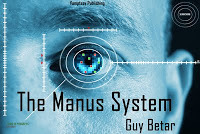 The Manus System by Guy Betar is a brief, intriguing science fiction story that tantalises the reader with its premise. It is a substantial bite of tempting science fiction.
The Manus System by Guy Betar is a brief, intriguing science fiction story that tantalises the reader with its premise. It is a substantial bite of tempting science fiction.
The story postulates the scientific advancement of an integrated human/spaceship control system and narrates the inaugural launch of this ship. The story's point of view is from pilot as he prepares to test the new system and the author does a nice job of mingling the nervousness of the character with the technical aspects of the plot.
One of the best features of The Manus System is the smooth blend of the science into the plot, without becoming so procedural that your eyes glaze over as you read. You get a great sense of tension and dealing with the unfamiliar from the main character that leads to a wonderfully intriguing ending.
The Manus System does favour explanatory passages over dialogue, but given the nature of the plotline it is a logical structure and not a detriment to the overall story. I enjoyed this story and recommend it.
My Review of When Dragons Sleep by William Fulks:
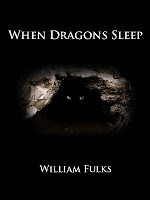 The story When Dragons Sleep has a nice fantasy premise, the proverbial quest to slay a dragon. The two main characters, Bishop, a magical cleric and the elf Thormir are drawn into this mission by a stranger and find an adventure with surprising results.
The story When Dragons Sleep has a nice fantasy premise, the proverbial quest to slay a dragon. The two main characters, Bishop, a magical cleric and the elf Thormir are drawn into this mission by a stranger and find an adventure with surprising results.
I found When Dragons Sleep had a decent, solid plot and I liked the reliable fantasy setting. The portrayal of characters is well realized and their relationships are soundly formed. The ending is the best part, being both atypical and dark.
I thought this story had real potential, but unfortunately When Dragons Sleep leans too much on passive, lengthy, detailed description and protracted, somewhat prosaic, dialogue passages which create a very slow narrative and dull story flow. The plot is imaginative and well realized, but it simply did not engage my attention as it should. It could have been great, instead of just good.

My Review of The Manus System by Guy Betar:
 The Manus System by Guy Betar is a brief, intriguing science fiction story that tantalises the reader with its premise. It is a substantial bite of tempting science fiction.
The Manus System by Guy Betar is a brief, intriguing science fiction story that tantalises the reader with its premise. It is a substantial bite of tempting science fiction.The story postulates the scientific advancement of an integrated human/spaceship control system and narrates the inaugural launch of this ship. The story's point of view is from pilot as he prepares to test the new system and the author does a nice job of mingling the nervousness of the character with the technical aspects of the plot.
One of the best features of The Manus System is the smooth blend of the science into the plot, without becoming so procedural that your eyes glaze over as you read. You get a great sense of tension and dealing with the unfamiliar from the main character that leads to a wonderfully intriguing ending.
The Manus System does favour explanatory passages over dialogue, but given the nature of the plotline it is a logical structure and not a detriment to the overall story. I enjoyed this story and recommend it.
My Review of When Dragons Sleep by William Fulks:
 The story When Dragons Sleep has a nice fantasy premise, the proverbial quest to slay a dragon. The two main characters, Bishop, a magical cleric and the elf Thormir are drawn into this mission by a stranger and find an adventure with surprising results.
The story When Dragons Sleep has a nice fantasy premise, the proverbial quest to slay a dragon. The two main characters, Bishop, a magical cleric and the elf Thormir are drawn into this mission by a stranger and find an adventure with surprising results.I found When Dragons Sleep had a decent, solid plot and I liked the reliable fantasy setting. The portrayal of characters is well realized and their relationships are soundly formed. The ending is the best part, being both atypical and dark.
I thought this story had real potential, but unfortunately When Dragons Sleep leans too much on passive, lengthy, detailed description and protracted, somewhat prosaic, dialogue passages which create a very slow narrative and dull story flow. The plot is imaginative and well realized, but it simply did not engage my attention as it should. It could have been great, instead of just good.
Published on May 23, 2011 06:00
May 22, 2011
Sci-fi Sequel Success: A Review of Trans-Human
My Book Review of Trans-Human by David Simpson:
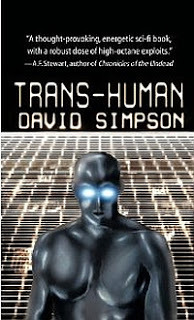 Trans-Human by David Simpson is an engaging sequel that will delight fans of his book Post-Human. It is a thought-provoking, energetic sci-fi book, with a robust dose of high-octane exploits.
Trans-Human by David Simpson is an engaging sequel that will delight fans of his book Post-Human. It is a thought-provoking, energetic sci-fi book, with a robust dose of high-octane exploits.
This book carries the story forward after the occurrences in the first book, but it is not a standalone sequel; it does reference Post-Human and I think both novels should be read in sequence. In Trans-Human far-reaching consequences from the events in Post-Human have come calling, looking for the Artificial Intelligence that summoned them. Are they friend or foe? Who is lying, who can be trusted and was the malicious A. I. really defeated?
The first part of the novel is very fast paced; the reader is thrown into action scenes that are pelted at your senses almost to the point of confusion. I say almost, because half-way through the book a revelation transpires that pulls everything into focus and turns the perspective of the narrative. From that point the book extends its reach through the conflict and into an absorbing introspective and theoretical storyline.
I found the book enjoyable and entertaining, nicely balancing the scientific storyline with the characters, both ally and enemy. The novel raises interesting questions about the nature of being, and the ending -if a happy one- poses its own great exploratory uncertainty. So, if you like your science fiction speculative, philosophical, a little theological and action-packed, Trans-Human is the book for you.

 Trans-Human by David Simpson is an engaging sequel that will delight fans of his book Post-Human. It is a thought-provoking, energetic sci-fi book, with a robust dose of high-octane exploits.
Trans-Human by David Simpson is an engaging sequel that will delight fans of his book Post-Human. It is a thought-provoking, energetic sci-fi book, with a robust dose of high-octane exploits.This book carries the story forward after the occurrences in the first book, but it is not a standalone sequel; it does reference Post-Human and I think both novels should be read in sequence. In Trans-Human far-reaching consequences from the events in Post-Human have come calling, looking for the Artificial Intelligence that summoned them. Are they friend or foe? Who is lying, who can be trusted and was the malicious A. I. really defeated?
The first part of the novel is very fast paced; the reader is thrown into action scenes that are pelted at your senses almost to the point of confusion. I say almost, because half-way through the book a revelation transpires that pulls everything into focus and turns the perspective of the narrative. From that point the book extends its reach through the conflict and into an absorbing introspective and theoretical storyline.
I found the book enjoyable and entertaining, nicely balancing the scientific storyline with the characters, both ally and enemy. The novel raises interesting questions about the nature of being, and the ending -if a happy one- poses its own great exploratory uncertainty. So, if you like your science fiction speculative, philosophical, a little theological and action-packed, Trans-Human is the book for you.
Published on May 22, 2011 09:09
May 1, 2011
Into the Mists of Arthurian Legend: A Review of The Circle Cast
My Book Review of The Circle Cast: The Lost Years of Morgan le Fay by Alex Epstein:
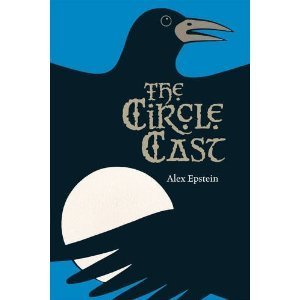 The Circle Cast: The Lost Years of Morgan le Fay by Alex Epstein is an excellent addition to the genre of Arthurian folklore and legend. The author crafts worlds past with a deft hand, easily pulling a reader into the story.
The Circle Cast: The Lost Years of Morgan le Fay by Alex Epstein is an excellent addition to the genre of Arthurian folklore and legend. The author crafts worlds past with a deft hand, easily pulling a reader into the story.
The book tells the story of the Arthurian sorceress Morgan le Fay. The Circle Cast portrays the early years of this character, first as the child Anna and then as Morgan after she flees Britain to Ireland. It tells the story of her life as a stranger in a strange land, enslaved and surviving hardship to return to Britain and reclaim what she lost.
The plotline is fresh, delving into a piece of Arthurian legend not excessively written about, yet still keeping to the traditional lines of the tale. The author has a nice take on the magical aspects of the story, weaving a mysterious aspect in to the narrative by his effective use of Celtic religion and myth.
The writer also does an exceptional job at creating the main character, making her a full person with fears, doubts and weakness, while still showcasing her strength of purpose. The people surrounding her are nicely sketched as well, interacting and bringing the world around Morgan to life, filling a past age with solid reality.
Being a devotee of the Arthurian legends, I've read many books on the subject, both fiction and non-fiction, and this delightfully enchanting novel is a welcome complement to the mythology.
Also available at Amazon.ca:
http://www.amazon.ca/gp/product/1896580637/
 The Circle Cast: The Lost Years of Morgan le Fay by Alex Epstein is an excellent addition to the genre of Arthurian folklore and legend. The author crafts worlds past with a deft hand, easily pulling a reader into the story.
The Circle Cast: The Lost Years of Morgan le Fay by Alex Epstein is an excellent addition to the genre of Arthurian folklore and legend. The author crafts worlds past with a deft hand, easily pulling a reader into the story.The book tells the story of the Arthurian sorceress Morgan le Fay. The Circle Cast portrays the early years of this character, first as the child Anna and then as Morgan after she flees Britain to Ireland. It tells the story of her life as a stranger in a strange land, enslaved and surviving hardship to return to Britain and reclaim what she lost.
The plotline is fresh, delving into a piece of Arthurian legend not excessively written about, yet still keeping to the traditional lines of the tale. The author has a nice take on the magical aspects of the story, weaving a mysterious aspect in to the narrative by his effective use of Celtic religion and myth.
The writer also does an exceptional job at creating the main character, making her a full person with fears, doubts and weakness, while still showcasing her strength of purpose. The people surrounding her are nicely sketched as well, interacting and bringing the world around Morgan to life, filling a past age with solid reality.
Being a devotee of the Arthurian legends, I've read many books on the subject, both fiction and non-fiction, and this delightfully enchanting novel is a welcome complement to the mythology.
Also available at Amazon.ca:
http://www.amazon.ca/gp/product/1896580637/
Published on May 01, 2011 11:36
April 26, 2011
Love and Brains: A Review of Hungry For You
My Book Review of Hungry For You by A. M. Harte:
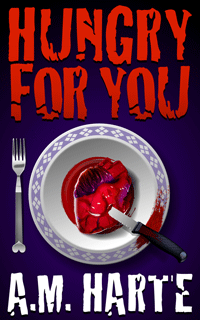
Any book that starts with a zombie apocalypse love poem is my kind of tome. Hungry For You by A. M. Harte is a well penned, alluring collection of romance stories laced with a satirical edge of zombie madness.
The book is a gentle smorgasbord of dark horror, small portraits of life gone horribly wrong, but still clinging to some redemption. It is a glimpse of love surviving in the zombie apocalypse, and once or twice, of other tales of undead romance. As one might expect, I enjoyed some stories more than others, but they were all well-written, engaging and great fun to read.
Hungry for You has a subtle touch of dark humour, but also has a sweet undercurrent of affection and warmth. It maintains love can survive total catastrophe, that even zombies have a heart.
Hungry for You is an interesting take on your typical zombie story, and will keep you entertained, as well as occasionally queasy.


Any book that starts with a zombie apocalypse love poem is my kind of tome. Hungry For You by A. M. Harte is a well penned, alluring collection of romance stories laced with a satirical edge of zombie madness.
The book is a gentle smorgasbord of dark horror, small portraits of life gone horribly wrong, but still clinging to some redemption. It is a glimpse of love surviving in the zombie apocalypse, and once or twice, of other tales of undead romance. As one might expect, I enjoyed some stories more than others, but they were all well-written, engaging and great fun to read.
Hungry for You has a subtle touch of dark humour, but also has a sweet undercurrent of affection and warmth. It maintains love can survive total catastrophe, that even zombies have a heart.
Hungry for You is an interesting take on your typical zombie story, and will keep you entertained, as well as occasionally queasy.
Published on April 26, 2011 11:23
April 25, 2011
Writing Tip: Passive Voice
There is a bane of the writer, one horror that can bring down the most prolific pen. It is the dreaded...
"Passive Voice"
Passive voice feeds on all those words of "was", "were", "begin to", "have been", "had", "almost" and the rest of their ilk that pepper through the narrative. And it kills the pace of your story, slowing the action, making your prose, gasp, boring.
Don't despair if you fight this problem, you are not alone. I struggle with this foe myself, weeding the "was" from my prose often, sighing as the war rages on. However, there is hope, as most instances of passive voice can be rewritten and if it creeps in to your drafts, it can be edited out.
So, take your stand against the passive voice and show your readers, do not tell.
Example:
Passive Voice:
Elwin was drawing his bow and was aiming his arrows at the Chimera as fast as he could. He was firing them, but he could see he was not having much effect on the creature. His arrows were hitting the beast and the beast was screaming in pain, but it was not falling. The Chimera was still moving forward, it was still coming.
Non-Passive Voice:
In rapid succession Elwin fired his arrows, each deadly projectile aimed at the heart of the Chimera. They hit their mark, blood drawn, but the beast still lumbered forward, screaming its pain, still coming for Elwin.
Now both examples narrate the same story, but the pace, the flow is different in each paragraph. Remember, the best way to describe a scene is not to tell it to your readers detail by detail, but to show it through well chosen descriptive words.
Good writing gives the reader what they need to form a picture, to inspire the imagination. It does not read like a step-by-step instruction manual.
"Passive Voice"
Passive voice feeds on all those words of "was", "were", "begin to", "have been", "had", "almost" and the rest of their ilk that pepper through the narrative. And it kills the pace of your story, slowing the action, making your prose, gasp, boring.
Don't despair if you fight this problem, you are not alone. I struggle with this foe myself, weeding the "was" from my prose often, sighing as the war rages on. However, there is hope, as most instances of passive voice can be rewritten and if it creeps in to your drafts, it can be edited out.
So, take your stand against the passive voice and show your readers, do not tell.
Example:
Passive Voice:
Elwin was drawing his bow and was aiming his arrows at the Chimera as fast as he could. He was firing them, but he could see he was not having much effect on the creature. His arrows were hitting the beast and the beast was screaming in pain, but it was not falling. The Chimera was still moving forward, it was still coming.
Non-Passive Voice:
In rapid succession Elwin fired his arrows, each deadly projectile aimed at the heart of the Chimera. They hit their mark, blood drawn, but the beast still lumbered forward, screaming its pain, still coming for Elwin.
Now both examples narrate the same story, but the pace, the flow is different in each paragraph. Remember, the best way to describe a scene is not to tell it to your readers detail by detail, but to show it through well chosen descriptive words.
Good writing gives the reader what they need to form a picture, to inspire the imagination. It does not read like a step-by-step instruction manual.
Published on April 25, 2011 13:22
April 20, 2011
Awards, Inspiration and Bloggers
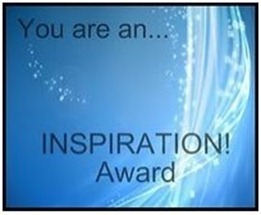
A big thank you to my friend, author and fellow Canadian, Joylene Nowell Butler who has graciously bestowed upon this blog the Inspiration Award
Here are the rules :
Thank and link back to the person who awarded this to you.
Link posts by you and ten fellow bloggers you find inspirational.
Forward the award to those ten fellow bloggers.
The following ten blogs are full of hard-working and imaginative people who definitely earn an award of inspiration:
Fantasy Casting
Post of Inspiration: http://fantasycasting.blogspot.com/2011/04/day-16-favorite-female-characters.html
SFF Chat
Post of Inspiration: http://blog.42scifi-fantasy.com/2011/04/more-fun-stuff-from-around-web.html
Murder by 4
Post of Inspiration: http://murderby4.blogspot.com/2011/04/hows-your-character-measure-up-to-life.html
Book Town Blog
Post of Inspiration: http://booktown-usa.blogspot.com/2011/02/excerpt-monday-ezekiel-code-by-gary-val.html
Beth Groundwater
Post of Inspiration: http://bethgroundwater.blogspot.com/2011/04/repeat-of-justice-is-served.html
Authors Promoting Authors
Post of Inspiration: http://authorspromotingauthors.blogspot.com/2011/04/sundays-stillpoint_17.html
Sheila Deeth
Post of Inspiration: http://sheiladeeth.blogspot.com/2011/04/reading-while-curled-up-in-blanket.html
Minnette Meador, World Weaver...
Post of Inspiration: http://minnettemeador.blogspot.com/2011/04/italy-or-england.html
Suzanne Trypak--Who's Imagining All This?
Post of Inspiration: http://ghostplanestory.blogspot.com/2011/04/thea-atkinson-flash-fiction-august-day.html
Poet Hound
Post of Inspiration: http://poethound.blogspot.com/2011/04/interview-with-ed-galing-about.html
Here's my review of an inspiring book: http://afstewartblog.blogspot.com/2011/01/luminescent-book-review-of-refracted.html
And as a bonus a few book recomendations from some of the fine authors listed above:
Published on April 20, 2011 08:35
April 17, 2011
Dark History Revisited: A Review of The Irish Slaves
My Book Review of The Irish Slaves: Slavery, Indenture and Contract Labour Among Irish Immigrants by Rhetta Akamatsu:
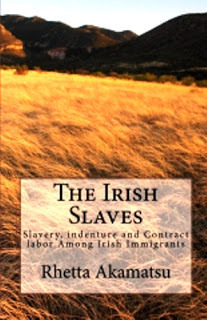 The Irish Slaves: Slavery, Indenture and Contract Labour Among Irish Immigrants by Rhetta Akamatsu is a history book that narrates, not only some overlooked history, but a tale of humanity that both endures and is abhorrent. It is a well researched, well-written book that opens a page on the slave trade of past ages.
The Irish Slaves: Slavery, Indenture and Contract Labour Among Irish Immigrants by Rhetta Akamatsu is a history book that narrates, not only some overlooked history, but a tale of humanity that both endures and is abhorrent. It is a well researched, well-written book that opens a page on the slave trade of past ages.
The book recounts the story of the terrible injustice perpetrated on the people of Ireland by England. It details the causes and cultural attitudes that led to this lucrative slave trade, and dissects the treatment of human beings used as a commodity.
The book divides itself by geography, taking each destination used in the Irish slave trade and documents the system and conduct of the people involved. The different laws and slave traditions are described for each region and the author adds historical accounts from the slaves and their masters that give a personal and insightful touch.
Generally, the narration flows smoothly, holding the reader firmly in the past, doling out the information in an engaging manner. The only flaws are some, perhaps unavoidable, repetition and the occasional typo that find their way into the pages, but they do not detract overly from the quality of the book.
The Irish Slaves is an absorbing read, making the history it recounts alive and vibrant in all its misery and perseverance. The book is a fascinating look into a piece of darker history.
Article first published as Book Review: The Irish Slaves: Slavery, Indenture and Contract Labour Among Irish Immigrants by Rhetta Akamatsu on Blogcritics.

 The Irish Slaves: Slavery, Indenture and Contract Labour Among Irish Immigrants by Rhetta Akamatsu is a history book that narrates, not only some overlooked history, but a tale of humanity that both endures and is abhorrent. It is a well researched, well-written book that opens a page on the slave trade of past ages.
The Irish Slaves: Slavery, Indenture and Contract Labour Among Irish Immigrants by Rhetta Akamatsu is a history book that narrates, not only some overlooked history, but a tale of humanity that both endures and is abhorrent. It is a well researched, well-written book that opens a page on the slave trade of past ages.The book recounts the story of the terrible injustice perpetrated on the people of Ireland by England. It details the causes and cultural attitudes that led to this lucrative slave trade, and dissects the treatment of human beings used as a commodity.
The book divides itself by geography, taking each destination used in the Irish slave trade and documents the system and conduct of the people involved. The different laws and slave traditions are described for each region and the author adds historical accounts from the slaves and their masters that give a personal and insightful touch.
Generally, the narration flows smoothly, holding the reader firmly in the past, doling out the information in an engaging manner. The only flaws are some, perhaps unavoidable, repetition and the occasional typo that find their way into the pages, but they do not detract overly from the quality of the book.
The Irish Slaves is an absorbing read, making the history it recounts alive and vibrant in all its misery and perseverance. The book is a fascinating look into a piece of darker history.
Article first published as Book Review: The Irish Slaves: Slavery, Indenture and Contract Labour Among Irish Immigrants by Rhetta Akamatsu on Blogcritics.
Published on April 17, 2011 12:29
April 14, 2011
Confessions of a Newbie Sci-fi Writer
We have a guest today, the talented author Pat Bertram, discussing her newest book, Light Bringer, and first foray into the world of science fiction:
Confessions of a Newbie Sci-fi Writer:
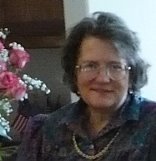 Once a long time ago, I crashed a Halloween party. Sounds very bold, doesn't it? But truly, it was out of character for me, and besides, I was in costume. I remember that the party was given by a friend of a friend, but I have no idea how or why I decided to go -- perhaps as a joke to see how long it would take for people to realize they didn't know me.
Once a long time ago, I crashed a Halloween party. Sounds very bold, doesn't it? But truly, it was out of character for me, and besides, I was in costume. I remember that the party was given by a friend of a friend, but I have no idea how or why I decided to go -- perhaps as a joke to see how long it would take for people to realize they didn't know me.
I dressed as a witch -- the whole bit: long black scraggly hair, puttied nose and chin almost meeting, heavy black brows, green-tinged skin, cackling voice. I walked into the party as if I belonged there, and for a while I was the belle of the ball as people tried to guess who I was. It finally occurred to one guy that I was a total stranger. So I left. Rather hurriedly.
That's how I feel now as a new science fiction writer -- as if I've crashed a party, and no one has yet discovered that I don't belong.
Am I a science fiction writer? Light Bringer takes place in the present day, not in some fantastic future or otherworldly setting. The characters are recognizably human. Most of the science is based either on what is known today or gleaned from ancient religious documents and mythology. There is more history than science. And yet, a couple of my characters are not quite human, there is talk of UFOs and of another planet in our solar system that might return to wreak havoc upon earth. And, more importantly, Light Bringer is about ideas, showing us humans in a different light. Do those few science fiction elements make my thriller science fiction? Will calling it science fiction give people the wrong idea about the book?
People like what they recognize. There are certain conventions that readers expect in their favorite genre, and they are unforgiving if their expectations are not met. What if they decide I'm only masquerading as a science fiction author?
And so here I boldly stand, acting as if I belong, but secretly wondering if anyone will guess that I am a stranger in a strange land.
Pat Bertram is a native of Colorado. When the traditional publishers stopped publishing her favorite type of book — character and story driven novels that can't easily be slotted into a genre — she decided to write her own. Second Wind Publishing liked her style and published four of Bertram's books: Light Bringer , Daughter Am I , More Deaths Than One , and A Spark of Heavenly Fire . Bertram blogs about life, writing and the writing life at http://ptbertram.wordpress.com and is the moderator of two online discussion groups that help both new and experienced authors further develop their craft: No Whine, Just Champagne on Gather.com and Suspense/ThrillerWriters on Facebook.
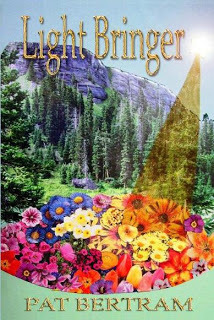 An Excerpt from Light Bringer:
An Excerpt from Light Bringer:
The silence dragged on for a minute, then he blew out a breath. "I saw a flying disc. A crescent, actually, the shape of a cookie with a bite taken out of it."
She barely refrained from rolling her eyes. Having read Georgy's books, she knew there were no flying saucers. Except in a few rare cases where they didn't have enough information, every single sighting had a plausible, prosaic explanation.
Realizing Mac was waiting for her reaction, she said in a noncommittal voice, "You saw a UFO."
He winced. "UFO? No. An FO. There was nothing unidentified about it. I knew exactly what I saw."
"An extraterrestrial space ship," she said flatly.
"Of course not, and aliens didn't abduct me, either. It happened right after I closed on this property. Unable to sleep, I drove out here and was leaning against my rental car looking at the stars when the crescent flew directly overhead. I could see it as plainly as I'm seeing you right now.
The craft was about fifteen feet in diameter, made of a composite ceramic. A remarkably conductive amalgam of the most refined copper and the purest silver coated its underside, turning it into an electrical circuit offering no resistance to the wave of electromagnetic energy it floated on. It was absolutely silent, sweeping in ions from its flight path, like a whale feeding on plankton. The ionized air around it glowed, giving it an unearthly look, but it was very much terrestrial in origin."
Jane lifted her hands and let them drop. "How could you learn all that from one brief sighting?"
"I was part of a team working on a craft exactly like it, only we hadn't been able to get ours off the ground, at least not then."
She regarded him warily.
"I'm not insane," he said, answering her unvoiced question. "I'm an aerospace engineer, retired from the Jet Propulsion Lab in Pasadena."
You can check out my spotlight on Light Bringer:
http://afstewartpromotion.blogspot.com/2011/04/book-spotlight-light-bringer.html
Light Bringer is also available on Smashwords
Confessions of a Newbie Sci-fi Writer:
 Once a long time ago, I crashed a Halloween party. Sounds very bold, doesn't it? But truly, it was out of character for me, and besides, I was in costume. I remember that the party was given by a friend of a friend, but I have no idea how or why I decided to go -- perhaps as a joke to see how long it would take for people to realize they didn't know me.
Once a long time ago, I crashed a Halloween party. Sounds very bold, doesn't it? But truly, it was out of character for me, and besides, I was in costume. I remember that the party was given by a friend of a friend, but I have no idea how or why I decided to go -- perhaps as a joke to see how long it would take for people to realize they didn't know me.I dressed as a witch -- the whole bit: long black scraggly hair, puttied nose and chin almost meeting, heavy black brows, green-tinged skin, cackling voice. I walked into the party as if I belonged there, and for a while I was the belle of the ball as people tried to guess who I was. It finally occurred to one guy that I was a total stranger. So I left. Rather hurriedly.
That's how I feel now as a new science fiction writer -- as if I've crashed a party, and no one has yet discovered that I don't belong.
Am I a science fiction writer? Light Bringer takes place in the present day, not in some fantastic future or otherworldly setting. The characters are recognizably human. Most of the science is based either on what is known today or gleaned from ancient religious documents and mythology. There is more history than science. And yet, a couple of my characters are not quite human, there is talk of UFOs and of another planet in our solar system that might return to wreak havoc upon earth. And, more importantly, Light Bringer is about ideas, showing us humans in a different light. Do those few science fiction elements make my thriller science fiction? Will calling it science fiction give people the wrong idea about the book?
People like what they recognize. There are certain conventions that readers expect in their favorite genre, and they are unforgiving if their expectations are not met. What if they decide I'm only masquerading as a science fiction author?
And so here I boldly stand, acting as if I belong, but secretly wondering if anyone will guess that I am a stranger in a strange land.
Pat Bertram is a native of Colorado. When the traditional publishers stopped publishing her favorite type of book — character and story driven novels that can't easily be slotted into a genre — she decided to write her own. Second Wind Publishing liked her style and published four of Bertram's books: Light Bringer , Daughter Am I , More Deaths Than One , and A Spark of Heavenly Fire . Bertram blogs about life, writing and the writing life at http://ptbertram.wordpress.com and is the moderator of two online discussion groups that help both new and experienced authors further develop their craft: No Whine, Just Champagne on Gather.com and Suspense/ThrillerWriters on Facebook.
 An Excerpt from Light Bringer:
An Excerpt from Light Bringer:The silence dragged on for a minute, then he blew out a breath. "I saw a flying disc. A crescent, actually, the shape of a cookie with a bite taken out of it."
She barely refrained from rolling her eyes. Having read Georgy's books, she knew there were no flying saucers. Except in a few rare cases where they didn't have enough information, every single sighting had a plausible, prosaic explanation.
Realizing Mac was waiting for her reaction, she said in a noncommittal voice, "You saw a UFO."
He winced. "UFO? No. An FO. There was nothing unidentified about it. I knew exactly what I saw."
"An extraterrestrial space ship," she said flatly.
"Of course not, and aliens didn't abduct me, either. It happened right after I closed on this property. Unable to sleep, I drove out here and was leaning against my rental car looking at the stars when the crescent flew directly overhead. I could see it as plainly as I'm seeing you right now.
The craft was about fifteen feet in diameter, made of a composite ceramic. A remarkably conductive amalgam of the most refined copper and the purest silver coated its underside, turning it into an electrical circuit offering no resistance to the wave of electromagnetic energy it floated on. It was absolutely silent, sweeping in ions from its flight path, like a whale feeding on plankton. The ionized air around it glowed, giving it an unearthly look, but it was very much terrestrial in origin."
Jane lifted her hands and let them drop. "How could you learn all that from one brief sighting?"
"I was part of a team working on a craft exactly like it, only we hadn't been able to get ours off the ground, at least not then."
She regarded him warily.
"I'm not insane," he said, answering her unvoiced question. "I'm an aerospace engineer, retired from the Jet Propulsion Lab in Pasadena."
You can check out my spotlight on Light Bringer:
http://afstewartpromotion.blogspot.com/2011/04/book-spotlight-light-bringer.html
Light Bringer is also available on Smashwords
Published on April 14, 2011 09:51
April 12, 2011
Fewer Thrills Than Expected: A Review of Pandora's Succession
My Book Review of Pandora's Succession by Russell Brooks:
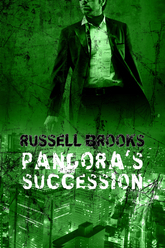 Pandora's Succession by Russell Brooks reads like a 1960's Bond thriller in a modern-day setting. The book plays out as a standard action story complete with flash and gadgets and the requisite evil villains, but is light on suspense.
Pandora's Succession by Russell Brooks reads like a 1960's Bond thriller in a modern-day setting. The book plays out as a standard action story complete with flash and gadgets and the requisite evil villains, but is light on suspense.
The novel is a spy thriller, and tells the story of Ridley Fox, a CIA agent, on the hunt for a deadly viral weapon named Pandora. Along the way he finds old enemies, friends and new threats.
The plotline showed promise with an intriguing and entertaining premise bursting with a lethal virus, cults and spies galore, but I found the author's style derailed any appeal for me. The prose leaned too heavily on passive voice and adverbs for my taste and this -unfortunately- diluted much of the book's tension. I also found that many scenes relied on explanation instead of straight action, slowing the flow of the novel. I wanted the exploits to simply happen and evolve naturally instead of relying on elaborate setup and extraneous detail.
As well, the characters, while reasonably well-written, failed to connect with me and I found them lacking in emotional depth. The dialogue often felt atypical and oddly out of place.
I liked the idea of Pandora's Succession, but I cannot say the book thrilled me.
 Pandora's Succession by Russell Brooks reads like a 1960's Bond thriller in a modern-day setting. The book plays out as a standard action story complete with flash and gadgets and the requisite evil villains, but is light on suspense.
Pandora's Succession by Russell Brooks reads like a 1960's Bond thriller in a modern-day setting. The book plays out as a standard action story complete with flash and gadgets and the requisite evil villains, but is light on suspense.The novel is a spy thriller, and tells the story of Ridley Fox, a CIA agent, on the hunt for a deadly viral weapon named Pandora. Along the way he finds old enemies, friends and new threats.
The plotline showed promise with an intriguing and entertaining premise bursting with a lethal virus, cults and spies galore, but I found the author's style derailed any appeal for me. The prose leaned too heavily on passive voice and adverbs for my taste and this -unfortunately- diluted much of the book's tension. I also found that many scenes relied on explanation instead of straight action, slowing the flow of the novel. I wanted the exploits to simply happen and evolve naturally instead of relying on elaborate setup and extraneous detail.
As well, the characters, while reasonably well-written, failed to connect with me and I found them lacking in emotional depth. The dialogue often felt atypical and oddly out of place.
I liked the idea of Pandora's Succession, but I cannot say the book thrilled me.
Published on April 12, 2011 10:51
March 31, 2011
Fantasy, Dreams and Heroes: A Review of Becoming
My Review of Becoming by Marc Johnson:
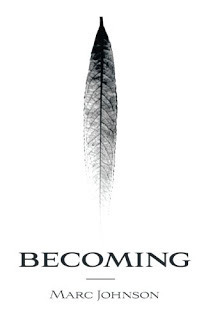 I found the book an allegorical and metaphorical banquet, full of symbolism, with many of its characters standing as fantasy archetypes. Part myth, part dark fable, Becoming by Marc Johnson is a swirling gathering of lyrical thoughts, characters and images dancing outward in a non-linear story.
I found the book an allegorical and metaphorical banquet, full of symbolism, with many of its characters standing as fantasy archetypes. Part myth, part dark fable, Becoming by Marc Johnson is a swirling gathering of lyrical thoughts, characters and images dancing outward in a non-linear story.
Becoming follows the quests of several characters: a boy, his father and their companion, a sister and brother and a hero as they wander through dreams and darkness. They embrace and fight against destiny but are inevitably drawn to their fate.
The book is a wonderful exposition that muses on the concept of the epic fantasy, while telling a rousing tale of good and evil laced with a sense of the unreal. It is a caprice of obscure complexity that makes your head spin (in a good way). Threads of thought on culture, religion, human nature and society seem to float through the pages as well, sweeping into the mix and blending well.
The book is poetic prose, imagery, parable, and character study strung along a twisting surreal road, and the narrative is beautiful to read. I had no problems with the existential nature of this book, but it may not be for all tastes. But if you are in the mood for a mind-bending, thought-provoking voyage, I recommend Becoming.

 I found the book an allegorical and metaphorical banquet, full of symbolism, with many of its characters standing as fantasy archetypes. Part myth, part dark fable, Becoming by Marc Johnson is a swirling gathering of lyrical thoughts, characters and images dancing outward in a non-linear story.
I found the book an allegorical and metaphorical banquet, full of symbolism, with many of its characters standing as fantasy archetypes. Part myth, part dark fable, Becoming by Marc Johnson is a swirling gathering of lyrical thoughts, characters and images dancing outward in a non-linear story.Becoming follows the quests of several characters: a boy, his father and their companion, a sister and brother and a hero as they wander through dreams and darkness. They embrace and fight against destiny but are inevitably drawn to their fate.
The book is a wonderful exposition that muses on the concept of the epic fantasy, while telling a rousing tale of good and evil laced with a sense of the unreal. It is a caprice of obscure complexity that makes your head spin (in a good way). Threads of thought on culture, religion, human nature and society seem to float through the pages as well, sweeping into the mix and blending well.
The book is poetic prose, imagery, parable, and character study strung along a twisting surreal road, and the narrative is beautiful to read. I had no problems with the existential nature of this book, but it may not be for all tastes. But if you are in the mood for a mind-bending, thought-provoking voyage, I recommend Becoming.
Published on March 31, 2011 10:00



